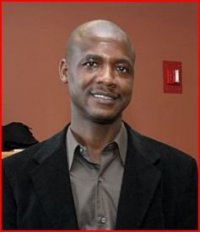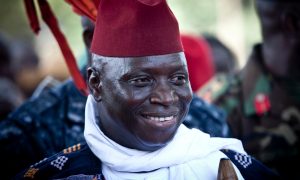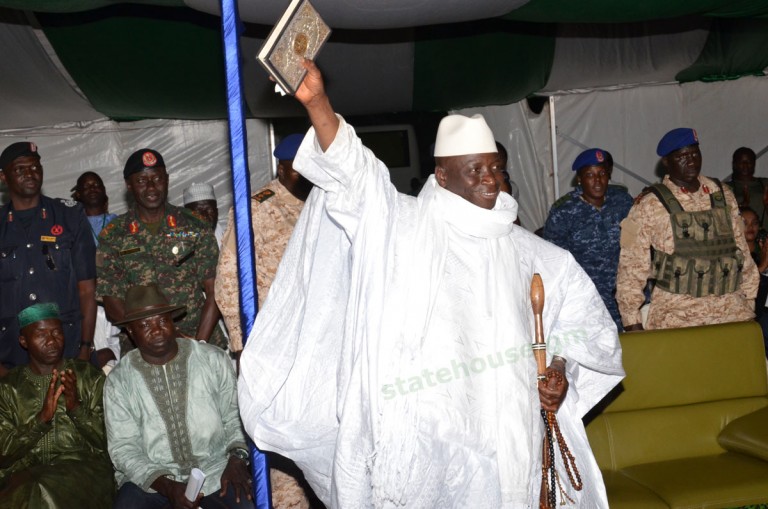
A hundred years from now, people still going to be talking about President Yahya Jammeh. He recognized that, as a poster child, he had become a symbol in which larger social, economic and political forces were condensed. As a person Yahya Jammeh lived in a way to anticipate his own commemoration.
In many ways referencing the past to bid for editorial prominences, using the past as a context to help explain a news event, and showing how people act in their everyday lives, sometimes very dramatic ways that incorporate a sense of past or future; journalism makes itself a vehicle or agent of political memory without the intention of commemorating. This article below was published eight years ago.
My archives reflections on personal, social, and political themes that have as much relevance today as they did in the era of the Yahya Jammeh’s rule.
First Published 2010
“Neither dictatorship nor democracy, paradise nor hell”
Behind the tall white walls of the grandiose home belonging to the youngest-ruling president, ostriches, buffalo, camels and all kinds of livestock roam neatly landscaped lawns—part of a vast private complex said to include a crocodile wetland and lake topped with lotus flowers.
In a poverty-stricken shell of a city outside, where the poorest pick through garbage for scraps to eat, is a portrait of Shiekh Yahya Jammeh, in long robes, holding a copy of the holy Quran along with a sword and prayer beads. The image of a sultan, he is omnipresent—His Excellency Sheikh Professor Doctor Colonel Alhagie Yahya AJJ Jammeh). He gazes solemnly from public building facades, beams proudly from ubiquitous billboards, and is woven into the fabric of countless green shirts worn from the coast of Banjul to the farthest reaches of the forested interior. He is referred to locally as Jilinka or Babilimansa.
He might be young in age—only 44—but he is larger than life in The Gambia, the West African nation he has ruled for 15 years.
Jammeh will soon be joining the list of longest-ruling heads of state, not counting the monarchs of Britain and Thailand, after Cuban dictator Fidel Castro, who served 49 years in power.
When he came into power, Yahya Jammeh became the youngest-ruling head of state. At age 29, he toppled the 30-year-long government of Sir Dawda Kairaba Jawara’s People’s Progressive Party (PPP) government, and thereby ended one of Africa’s longest-standing multi-party democracies. The Gambia was viewed (along with Botswana and Mauritius) as an “exception” on an African continent where authoritarianism and military regimes have been the norm. Apart from the aborted coup of 1981, The Gambia had enjoyed relative peace and stability since it attained independence from Britain in 1965.
Before Jammeh’s rule, The Gambia was known as the “smiling coast,” a place of sunshine, welcome and real generosity by its people. It became the home of the African Commission on Human and People’s Rights and headquarters of the African Center for Democracy and Human Rights Studies. It was the bastion of democracy in a continent beset by military takeovers and despotic regimes.
Unfortunately, all of that changed in July 1994, after the coup led by Jammeh. Most Gambians genuinely fear the 44-year-old autocrat, and there is little opposition to him—many accept his rule because he has kept his country remarkably peaceful, though to do so he has governed with sustained brutality characteristic of many other dictators.
“Allah brought him to us, and only Allah can call him away,” said Taxi man Momodu Lamin. “For us, there is only Yahya. He is irreplaceable.”
Momodu Lamin lives in the president’s native Kanilai, a tiny village rising out of jungle greenery at the end of a freshly paved road complete with high-wattage, functioning light poles—luxuries rare in most of Gambia’s undeveloped interior.
Gambia is not the only country that has faced oppressive leadership. In its struggle to stabilize after becoming independent of colonial rule in the 1960s, Africa has suffered its share of “Big Men,” many of whom use fear, patronage and rigged elections to cling to power. A few are still around, chiefly in Africa, such as Libya’s Moammar Gadhafi and Zimbawe’s Robert Mugabe, as well as Equatorial Guinea’s Teodore Obiang and Angola’s Jose Eduardo dos Santos.

Like many of the continents’ “Big Men,” Jammeh has displayed plenty of dictatorial tendencies. His government has jailed journalists who dared criticize him personally and has cowed most of the rest into self-censorship. The Gambia’s prisons are filled with political prisoners, and rivals to the regime disappear or turn up mysteriously dead in the night.
Jammeh “attacks his opponents by bringing them into his fold, offering them top posts, giving them a piece of the pie,” said a political science professor at the Gambia University who asked to remain anonymous. “He’s like a boa constrictor. He suffocates his prey until it’s weak, then swallows it.”
A prime example of this phenomenon is found in Lamin Waa Juwara, Jammeh’s principal opponent in the last elections. He is now serving Jammeh as Governor in the Lower River Division. He is a member of Jammeh’s party, and Gambian journalists say he doesn’t speak out much anymore.
“It’s belly politics,” the professor said. “If you don’t go along, you don’t eat.”
Gambia is faced with many other challenges under the current rule. The country is ranked 168th place among countries in sub-Saharan Africa on the UN Human Development Index, which measures literacy, education and other markers of national well-being. It puts Gambia amongst the lowest on the socio-economic development index.
The most vocal critics today of the regime are from an Internet forum called The Gambia-L, as well as from several newspapers, including the Gambia Post, Freedom Newspaper, Gambia Journal, Senegambia, and Gainako—most of the critics of the Gambia-L and Post (there’s no sign of some of them).
Gambia today is “neither dictatorship nor democracy, neither paradise nor hell,” said Alhagie Jaye, an activist currently living in New York. “We are something in between.”
Jammeh turned civilian after two years of military rule, and polls since then have been marred by allegations of election rigging and corruption. In addition, Parliament—dominated by his supporters—removed presidential term limits from the constitution.
Gambia is considered one of the smallest nations in sub-Saharan Africa, and Jammeh has built a vast system of patronage, doling out money generously in part through salaries and benefits that come with Cabinet posts. Unlike other West African countries, Gambia has always managed to pay its civil servants and has provided for its government officials every young Gambian’s dream—to be driving a Mercedes Benz or an SUV 4X4 or the American-made Hummer, to be a bureaucrat in a suit, walking air-conditioned halls insulated from the heat and poverty found just outside.
Ebrima Cham, a pro-Jammeh politician, acknowledged that “Gambia has its problems. There are poor roads, not enough schools, too much unemployment, but we have to fix things on our own time, in our own way—peacefully—not through war.”
“At least I can go to sleep without fearing my life,” he said. “In this part of Africa, there’s something to be said for that.”
Jammeh is regarded by some Gambians as “the devil they know.” While many would like to see change, they ‘re also afraid things could get a lot worst if he goes.
“There could be a catastrophic struggle for power—everybody fears that,” said journalist Yorro Jallow of the banned Independent newspaper, who was detained for days in 2003 after publishing an editorial titled “Who Owns Account No. 010010873901.” Another editorial that got the same journalist in trouble was entitled “Jammeh Pressed Over Missing Oil,” an article about the discovery of a secret supply of crude oil sent to The Gambia from Nigeria on concessionary terms where the proceeds of which were not reflected in the national budget.
At the main garbage dump in Bakoteh not far away from Banjul, some scavengers assaulted a pile of fresh trash. A man in a torn black kaftan plucked a tub of curdled apricot yogurt from the rubbish and gulped it down. A 34-year-old father found a broken clock he hoped to sell to help put his daughter through primary school.
Jammeh, by contrast, has amassed a fortune that makes him one of Africa’s richest men—nobody really knows how much he is worth, but there have been some indications of his vast wealth. Media reports have declared that he owns abundant real estate in Morocco and that he owned many businesses in The Gambia. He has also been accused of having opened several Swiss bank accounts, according to his former spokesperson, Ebou Jallow.
That Jammeh is likely to remain in power for the foreseeable future seems to be accepted by a population that regards him as the ultimate village chief. “Gambian culture dictates that you respect your elders,” said Jaye. “You can’t say ‘no’ to somebody who is your leader.”
Jammeh is our leader, “so most people just suffer in silence. ‘Gambia? No problem,’” he said. “The problem is Gambians don’t dream anymore, and when you don’t dream, your country is in trouble.”






I will not use the word commemorate in describing the legacy of a malevolent fool.
The fool, the far, the fiddled is the one we have MISmanaging the state of our affairs today. Bloated in corruptible practices, millions of dalasis mansiones in his one time impoverished rural hamlet where his entire entourage sorjourns, with a filthy plastic-littered metropolitan area where unbearable price rises strangle the lives of our citizens, the non-directional CORRUPT administration is touring the rural poor on baseless agenda.
Only the Chinese have tendered a helping hand.
The fool, the fat, the fiddled is the one we have MISmanaging the state of our affairs today. Bloated in corruptible practices, millions of dalasis mansiones in his one time impoverished rural hamlet where his entire entourage sorjourns, with a filthy plastic-littered metropolitan area where unbearable price rises strangle the lives of our citizens, the non-directional CORRUPT administration is touring the rural poor on baseless agenda.
Only the Chinese have tendered a helping hand.
I succeeded in refraining my village women on my project from wasting their time in attending his Basse meeting. They would left their useful farm work, petty trading to travel to Basse at their own costs only to listen to LIES and false promises from people who will return to Banjul in a few days to claim fat per diem emoluments from our taxpayers’ coffers for doing nothing other than consume and steal from our meagre resources.
My village women indeed agreed with me.
” I succeeded in refraining my village women on my project from wasting their time in attending his Basse rally” Oh! what a news worthy story when the shameless leaked audio of the top APRC brass with their lying coward squatter bragging about how they betrayed the trust of the Gambian people is shoved under the rug, but its the rally which is the issue. President Barrow must be inconsolable because women villagers working on Babu Soli’s great project were refrained from attending his rally. Keep the women on your project in bondage as your evil godfather Jammeh did to the Gambian nation. They will someday free themselves from your restraint just like the Gambian nation did from the evil grip of monster dictator Yahya Shameless Jammeh. The leaked audio is a clear manifestation of the moral decay that befell Yahya Jammeh and his top APRC thugs. Vulgarity, backstabbing, false prophecies, empty bravado the hallmark of Jammeh, the old toothless Tamba, and the ugly bulldog ex. mayor. What is stopping him from coming home except cowardice, knowing that his crimes will never go unpunished.
”My village women indeed agreed with me” Wow! they agreed with you! Who would disagree with their benefactor to his/her face? Professor Soli is a genius. I rest my case pal.
What did you say Babu, (for 22+ years) when babili-parakass mansha were doing just the same & probably worst then….?
Politicians could (always) do better; but the “great” among them are but (very) few…..
UDP too, could do better under the circumstances; but alas…….
The Barrow youth thing, for example, can’t be explained by the UDP openly to those making noise about amongst them; just for not “letting the cat out of the bag” to warn others who are oblivious & unsuspecting in the whole of it; so they’ll let some few UDP affiliates grumble about, whilst they keep moot; knowing the trick works for now…..
Please Babu when you’re down in kombo, if you can; give updates about South kombo (Sanyang, Gunjur, Kartong) too, on the environment issues, IF POSSIBLE…
What’s the EVIL kanilai Murderdom DEVIL ‘code-wordings’ in the infamous (aprc-gate) tapes…?
At least, (from your experience) you (one) can now say something in the Gambia, while on the ground, like you do, can’t we; (isn’t it) one single change, for you in particular…?
Please pa babu stop the hypocrisy and help those poor to attend meetings this one is gone if not how can government solve their problems without hearing their voices,I think that’s the most terrible and stupid move you’ve ever made since I started reading your comments and opinions ,government can’t give help when citizens don’t raise their concerns,to avoid this poor mother not attending and given them fat lies about the government is very inapropiate from you especially in a government you’ve never worked for, stop the nonsense and your hypocritical attitude and help the way forward with the little knowledge you have.thanks
It’s 23:07 late after a hard days work.
Look Baba, choose your vocabulary appropiateky beforr I send you on your mother’s laps. OK. I’m no match for your idiotic language. I am right here in the URR and passed by one of these useless meetings on my mo-bike. This fool was born and bred here, knows the plight of the rural poor, I asume, so why the time and resource wasting at this most onerous moment of the rainy season. With a large entourage of CORRUPT officials? You idiotic dunce, don’t get me weird. I am living with the dark rainy nights of my people,intense heat, very sunny days and toiling faces. Why do my people have to listen to LIARS?
Perhaps, one can reply this way: You know why? Because they’ve listen to similar LIES for 22yrs.
Bajaw,
Hopefully, I will visit Kombo Gunjur, Kartong and Sanyang on return to the Kombos. I’m currently here in my village in the URR and yet to visit my maternal aunties, grannies, cousins, uncles in CRR. But I hope to fulfill that promise to give accounts of my visits to Faraba Banta and the other places on return. Good night.
Enjoy your trip and holiday, but I will advise ALL to take your “reports” with a pinch of salt. Because right now, you’re acting like the proverbial ex-village alkalo.
Thanks Babu, enjoy the stay…
Babu for insulting my mom I will spear myself a time and you will soon hear from me
Baba,
I’m waiting for your response. I’m not a kid to start insults but old enough to swiftly respond to insults especially from rude elementos like you. Have you forgotten your insults.
When toddlers like you irresponsibly insult an elderly person like me, I go straight for their parents, my age group. That’s the best way to reply to rudeness.
I am enjoying my holidays with nice statements from Bax, Bajaw, Dr Sarr, Mwalimu and all responsible and educated contributors until you interrupted with your stupid insults.
I think with your old age as you mentioned is better you give yourself a respect and refrain yourself from exchanging sulty words with kids who can be your sons and daughters. I will reserve myself and will continue to give you respect, but onething be sure of, if such a statement come from you again you will receive much bitter insults from me,am not insulting your mom but you as a person as I respect my mom likewise yours because this two old women has nothing to with us,my question here is why on earth do like to insult people parents when this poor old elders has not done you any wrong?your this madness has to have boundry now causing people parents will never take you anywhere. Donkey head, as you use to call people this name too. You are a funny character
Baba,
Don’t be silly. If you aren’t insulting my parents but me in particular, you are insulting a parent. I know you dare not insults me in the face, ’cause I have children and grandchildren who will get the hell out of you. Never insult me again because when you do you are insulting a respectable father. I will only respond by insulting your parents who might be my age group, not you. Get that right.
If you are living in a glass house, you shouldn’t be throwing stones. Those who live by the sword died by the sword. Those who dishes out insults like confetti to all whom he/she disagreed with, should be prepared to be insulted. A respectable father who made a name for himself for vulgarity, innuendo and rudeness. Your children, grandchildren and students will not be proud of you if they read all your postings in this forum, some of which were so obscene, couldn’t be imagined that they were uttered by a Gambian Muslim.
You are just a frustrated old man I will never respond again because you lack respect
I think you misunderstand the word respect,you keep on insulting people that will benefit you one day,and I will never use faul words to you again and why are you always so hostile?
You talking about your children and grandchildren, oh babu am just wordless about that statement, you what enjoy the rest of your life that’s good you because if I answer to question, it will be disastrous between us.